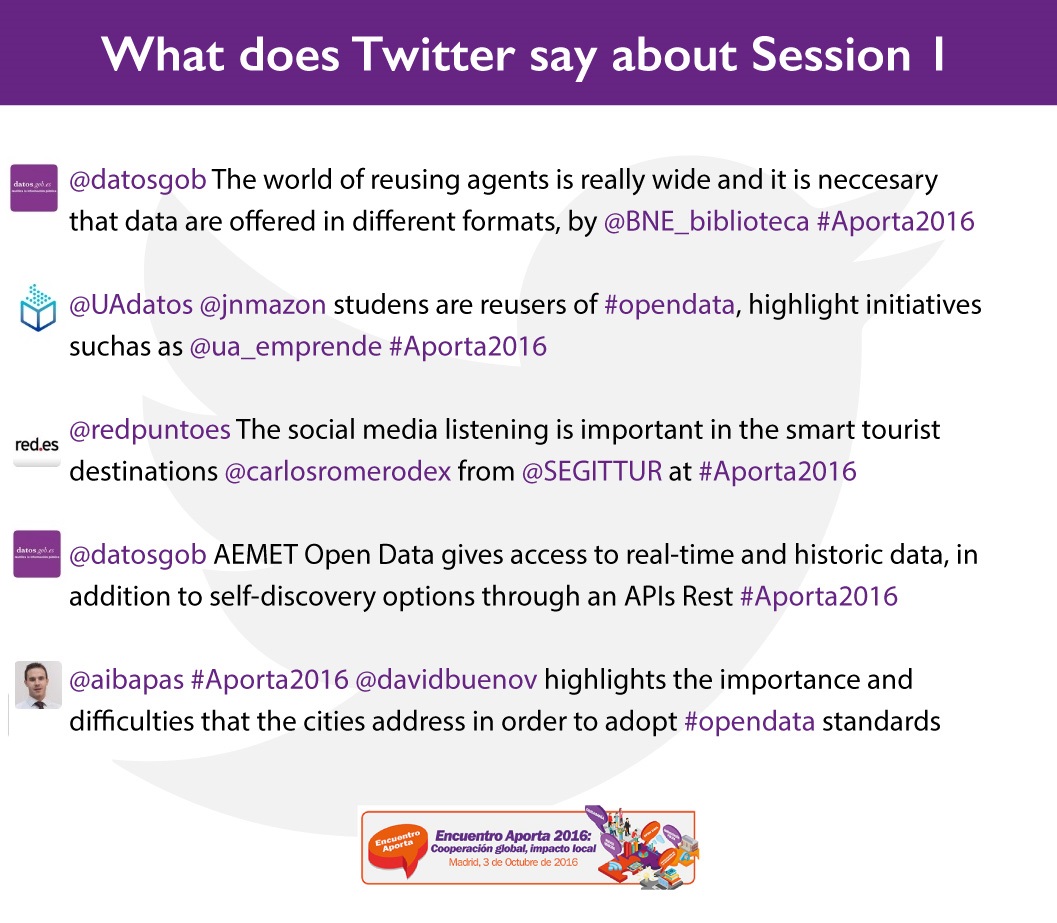
The big open data week has started with the sixth edition of Encuentro Aporta 2016, the annual event for the open data community in Spain. This time, the event was divided into three different sessions designed to analyse the most important aspects of the sector from the point of view of public entities, businesses and open data professionals.
Victor Calvo-Sotelo, Secretary of State for Telecommunications and Information Society of the Ministry of Industry, Energy and Tourism was responsible for opening the meeting, who put a spotlight on the power of change and socio-economic potential of open data. The first panel, entitled Coordination and harmonization as key success factors in data publication, included representatives of five public institutions in the weather, municipal, tourist, cultural and academic industry.
Thus, Jesus Montero from AEMET showed the attendees the different open data initiatives carried out by the organization to date such as the FTP data or PSI catalogue, announcing the upcoming launch of an open data portal that will provide access both to weather information in real time and historical data from the meteorological agency. Unlike previous solutions, the new platform will allow automated queries to the API-REST as well as options of self-discovery. Moreover, in compliance with the INSPIRE directive, the portal will not only provide weather information but also geospatial data that will be useful to the transport, maritime or aerospace industry.
Later, it was, then, the turn of the tourism sector. Carlos Romero from SEGITTUR explained the importance of open data in the development of Smart Destinations. Through devices such as sensors and the Internet of Things, information can be collected and contextualized to create smart tourist destinations, based on measurement, analysis and reuse of data to make better decisions for citizens and tourists.
Using the opportunity, the expert explained to the assistants the operation of a platform on which the entity is working, which gathers different data repositories belonging to origin and destination of tourists. Through the system all information is analysed to generate real-time and personalized services for tourists and to optimize the national tourist industry.
Cultural data also had their place in this initial session thanks to José Luis Bueren from the National Library of Spain, who put the focus on two main ideas. First, the opportunity of the openness of cultural information to give greater visibility to the work of the organization, and on the other hand, the importance of creating reusing tools for professionals, citizens and other entities that can make use of cultural data. Furthermore, the essential role of the community in the open data ecosystem was also highlighted; it is necessary to show that institutions are open to listen and meet the needs of different audiences on openness of information. After all, the emergence of new technologies and the agreement signed with Red.es, the BNE has added new services to citizens beyond the traditional work that is still maintained.
The attendees of Encuentro Aporta had also the opportunity to know the real experience of two local institutions in their implementation of an open data initiative. Malaga City Council, through David Bueno, explained the need to evangelize the data keepers to provide information to the data seekers who may provide useful solutions, even to public administrations, based on open data. In addition, the expert shared with the audience the difficulties that public administration is facing to publish the generated data in interoperable and reusable format.
In the case of the University of Alicante, with Jose N. Mazon, the challenges of openness of information were addressed and he highlighted training as a key tool for students to know how to exploit open data, and the reuse public sector information, not only as a socioeconomic engine, but as a fertile and creative resource to help students develop entrepreneurial skills. To this end, the institution has developed a comprehensive program of workshops, hackathons, lectures and events to show the potential of the reuse of open data to the academic community and implement entrepreneurial projects within the university framework.
The first session of the day sparked a lively debate among attendees and speakers who presented their experiences as public entities involved in the process of openness of the information not only highlighting the good practices achieved to date but showing also the limitations and barriers found by the bodies on their way to open data.
